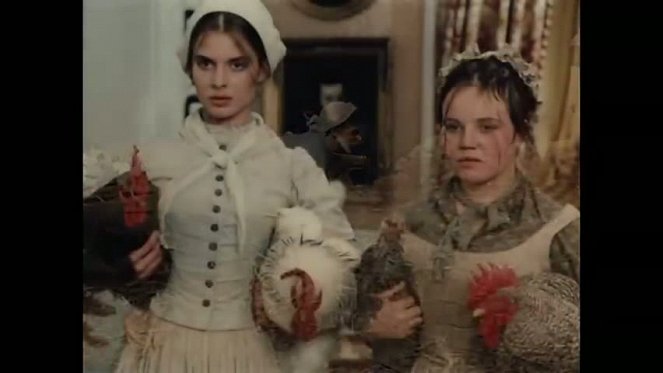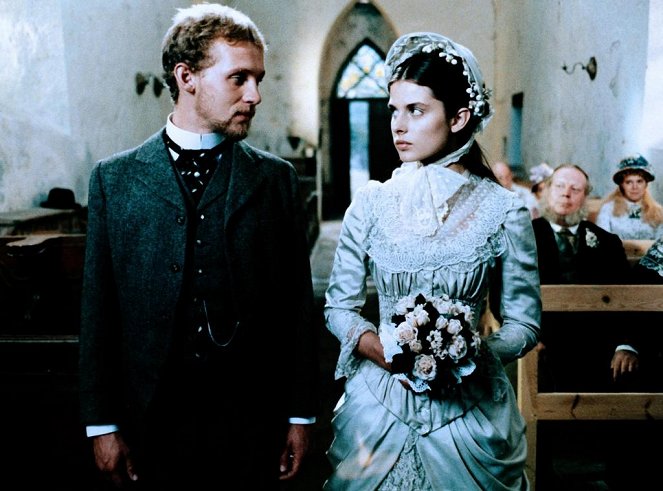Réalisation:
Roman PolańskiMusique:
Philippe SardeActeurs·trices:
Nastassja Kinski, Peter Firth, Tom Chadbon, Leigh Lawson, Richard Pearson, Suzanna Hamilton, John Barrett, Pascale de Boysson, Arielle Dombasle (plus)Résumés(1)
Dans l'Angleterre du 19ème siècle, un paysan du Dorset, John Durbeyfield, découvre par hasard qu'il est le dernier descendant d'une grande famille d'aristocrates. Motivé par le profit qu'il pourrait tirer de cette noblesse perdue, Durbeyfield envoie sa fille aînée, Tess, se réclamer de cette parenté chez la riche famille des d'Urberville. Le jeune Alec d'Urberville, charmé par la beauté de sa « délicieuse cousine », accepte de l'employer et met tout en oeuvre pour la séduire. Tess finit par céder aux avances d'Alec et, enceinte, retourne chez ses parents où elle donne naissance à un enfant qui meurt peu de temps après. Fuyant son destin, Tess s'enfuit de son village et trouve un emploi dans une ferme où personne ne connaît son malheur. Elle y rencontre son véritable amour : un fils de pasteur nommé Angel Clare. Ce dernier, croyant que Tess est une jeune paysanne innocente, tombe éperdument amoureux d'elle et, malgré l'abîme social qui les sépare, la demande en mariage. Mais lors de la nuit de noces, Tess confie à Angel son lourd secret. Accablé, incapable de lui pardonner, Angel quitte Tess et part pour le Brésil. Pendant de longs mois, Tess attend désespérément le retour de son mari en travaillant dur pour sa survie et celle de sa famille, jusqu'à ce que le destin ramène Alec d'Urberville dans sa vie. (Pathé Films)
(plus)Vidéo (7)
Critiques (2)
Another Thomas Hardy story that made me want to shoot myself. It’s either film therapy or Victorian logic for the advanced. However, with the passage of time, I return to Hardy in many guises, and I will always see Tess through the prism of Polanski's tragedy. Alas. Even though the truth is that the story of the abused Tess would have been enough of an identity crisis on its own without the Manson crew of imbeciles.
()
The three Oscars won accurately reflect the strengths of the film. The excellent production design that transports the viewer to England in the second half of the 19th century, convincing period costumes that evoke a sense of absolute authenticity, and the traditionally reliable camera are all typical pillars of Polanski's films. This director has been one of my favorites from the beginning and I'm used to him usually piquing my curiosity and guaranteeing my attention. That is, until now... Unfortunately, the nearly three-hour runtime is noticeable. In terms of drama, the film functions significantly worse, and I would attribute that to Thomas Hardy. The classic English author wrote novels for a different time, and I admit that although I managed to decipher Russian classics in my time, I could only read Hardy with a gun pressed to the back of my head. Turning it into a three-part miniseries would have been much more suitable for adapting a novel with only minimal strong emotional scenes. Nastassja Kinski is charming, innocent, romantic, appropriately naive, and simple-minded in the role of a Victorian girl. Tess and her chosen one are portrayed by Hardy as nothing more than helpless victims of Victorian prudish official morality (of course, there was also its other side, probably never so distinctly shown anywhere as the stark difference between publicly proclaimed restraint and taboos on sex and base reality. In London at the time the novel was published, one prostitute accounted for every seven men, and it was no different in other urban centers like Manchester or Liverpool). However, from Hardy, who had a tendency to idealize society and especially the countryside, nothing else can be expected. It has never happened to me before, with Polanski, that I would even momentarily consider giving a film of his only two stars, but I was unable to watch Tess in one sitting, which speaks for itself. The film fails to evoke stronger emotions and unfolds predictably, perhaps with the exception of the completely unnecessary violent death in the inn room, which, however, seems absurd in the context of the story. In his attempt to do the best job possible, Polanski somewhat fell into the trap of film academism, but so be it, I forgive him. Overall impression: 55%.
()



Annonces